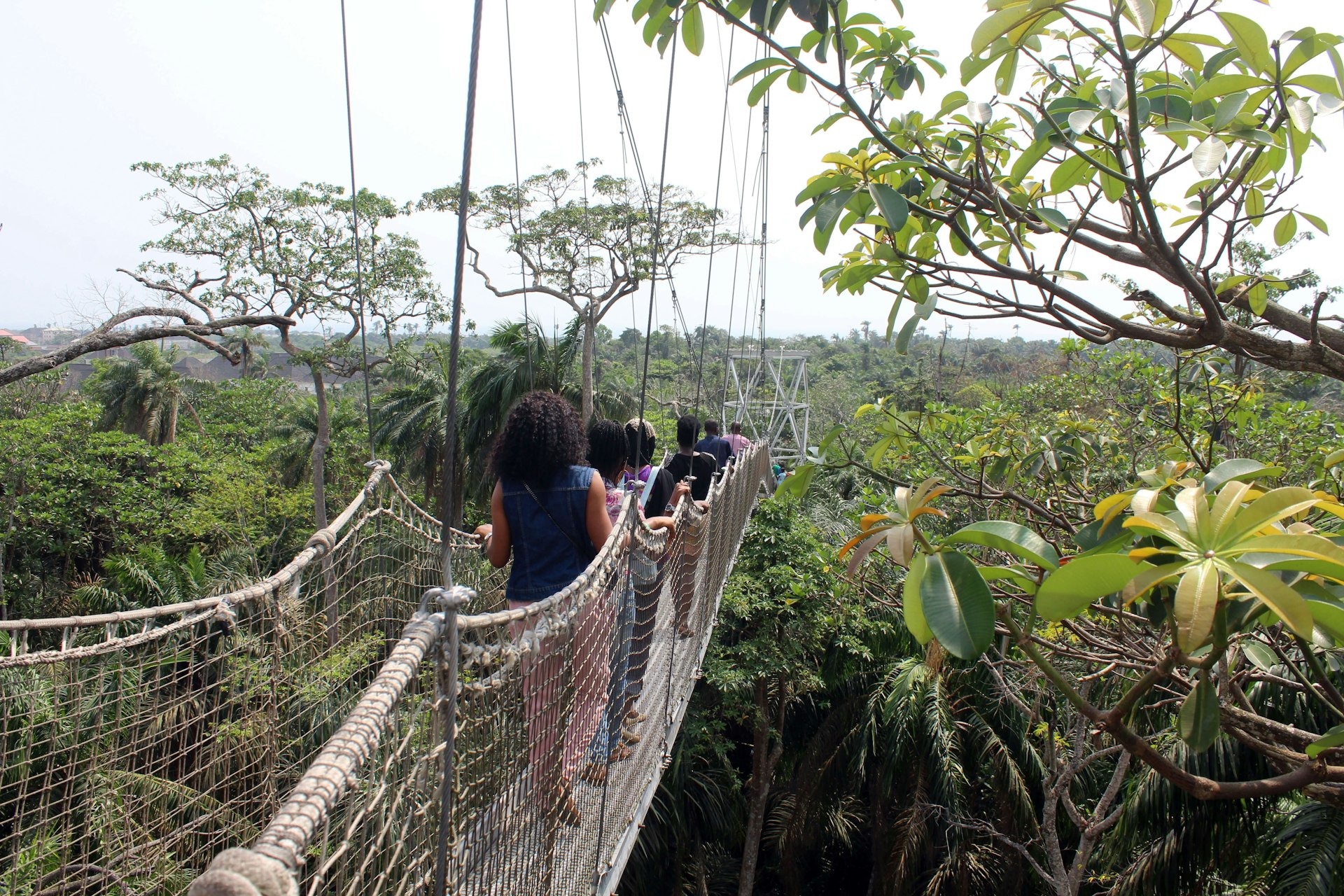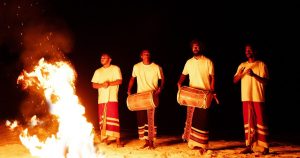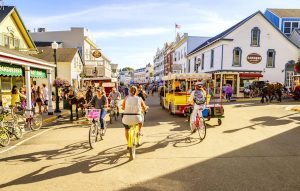
Nigeria’s diverse landscape and extensive river systems create lots of scenic opportunities for hiking, and there are plenty of kindred spirits to share the experience with.
The cities of Abuja and Jos have dozens of hiking groups that organize trips almost every weekend. Destinations like Makurdi and Ososo are also now beginning to emerge as good places to hike. Enugu, Ilorin, Ekiti and Bauchi also have active hiking communities, though outings are less frequent.
Nigerian hiking trails generally lead to hilltops, but a good number stretch through farmland and forests or pass lakes and streams. Some lead to caves and rock shelters where locals fled during the slave raiding and wars of the 18th and 19th centuries.
At Olumo Rock, Oke Ado Awaye and Idanre, locals have built hundreds of steps at the foot of the hills to ease the ascent.
Most of the hikes recommended here are easy to moderate and don’t require any gear other than a hiking stick, boots, and water. Whichever hike you choose, you can rest assured you’re in for a sweaty but unforgettable experience. Here are the best hikes in Nigeria.
Scout new ways to explore the planet’s wildest places with our weekly newsletter delivered to your inbox.  Hiking in Nigeria means some wonderful views © i_am_zews / Shutterstock
Hiking in Nigeria means some wonderful views © i_am_zews / Shutterstock
1. Oke Ado Awaye
Best hike for views
4 miles (6.4km) round trip, 3 hours, moderate
Oke Ado Awaye is famous for its suspended lake, Iyake. Guides say it never dries up and remains at the same level all year round. During this 4-mile trek, hikers come to hear the myths surrounding the lake and the other landmarks on the hill.
It is said that drinking water from the lake can aid fertility and prayers said at Ishage Rock are usually answered. Large depressions in the rock, which is wrapped around in white cloth, are believed to be footprints of the gods who once protected the people.
These landmarks serve as natural rest stops along the moderate trail, which offers astonishing views of farmland and the surrounding hills. Most tourists turn back at the steep incline linking the two interconnected hills (about an hour into the trek), but to do that is to miss perhaps the most important landmark of all: the spot where the old palace once stood, and the heart of a 19th-century hilltop settlement, now marked with a circle of stones.
Planning tip: OkeAdo Awaye is roughly two hours by road from the southwestern cities of Ibadan and Abeokuta. Plan your hike with TVP Adventures.
2. IITA Forest Trail
Best educational hike
1.2 miles (2km) round trip, 15 mins-5 hours, moderate-strenuous
You could go for a brisk 2- to 6km walk through the serene grounds of the International Institute of Tropical Agriculture (IITA) in Oyo state. Or you could sign up for a hike through its 350-hectare forest reserve, which offers a 12-point trail graded into three levels: the short loop, for kids (15 mins); the medium loop, for adults (roughly an hour); and the long loop, for skilled hikers (five hours).
If you set out early enough you’ll likely spot duikers, civets, antelopes, squirrels and monitor lizards foraging for breakfast. Even if you don’t, your time in the woods will be well spent learning about the many medicinal trees along the trail, and how they’re used locally. At the end of your hike, you may stop to watch flocks of spur-winged lapwings or Senegal thick-knee birds fly over the adjoining lake.
Planning tip: IITA is a 20-minute drive from the new Obafemi Awolowo train station at Moniya. Hikes are led by staff and must be pre-booked at least a week in advance.
 Hikers walk along Africa’s longest canopy walkway at Lekki Conservation Center © Dumbra / Shutterstock
Hikers walk along Africa’s longest canopy walkway at Lekki Conservation Center © Dumbra / Shutterstock
3. Ekki Forest Adventure
Best hike for birdwatching
2.4 miles (4km) round trip, 1.5 hours, easy
A canopy of coconut, neem and peach trees are the first things you’ll notice when you walk into the Lekki Urban Forest Animal Sanctuary Initiative (LUFASI) park, a 20-hectare farm-forest and recreation center. Promoted as a ‘natural wellness center’, the park is big on habitat preservation and re-generation and hikers walk along its sandy and leaf-strewn trails, past butterfly and fern gardens, anthills and duck ponds.
On your way, guides will tell you about the various ongoing conservation efforts within the park, including for pangolins and hooded vultures. A Shirin Yoku (forest bathing) platform surrounded by some prized Ekki (Red Ironwood) trees, which give the trail its name, is where walkers tend to pause and take it all it. Boardwalks across the park’s two artificial lakes are perfect spots to look out for some of the birds found here, including the blue-breasted kingfisher, African harrier hawk, and little bee-eater.
Planning tip: LUFASI has a children’s play area and restaurants serving palm wine, pepper-soup and jollof-rice, all local treats. The park is a 40-minute drive from Lekki Conservation Center, and an hour from the Yemisi Shyllon Museum of Modern Art at Pan-Atlantic University. They are all on the Lekki-Epe Highway, so doable on a day’s tour.
4. Ikogosi Springs Hike
Best for nature walks
1.2 miles (2km) round trip, 1.5 hours, easy
Ikogosi-Ekiti is buried in a vast span of unspoiled lowland forest. The hour-long drive from Ado-Ekiti, the capital city of Ekiti state, weaves through dense vegetation and hills on both sides. Although the winding road is paved, there are potholes and patches here and there. But arriving at the charming surroundings of the Ikogosi Warm Springs Resort more than makes up for the inconvenience.
The hike begins at the back of the resort’s amphitheater, a short distance from the west gate. As you make your way along the narrow trail, stepping over fallen trunks and sticks, the in-house guide narrates the history of the town, its earliest settlers, and how a series of mythical events resulted in one of Nigeria’s rare geological wonders – the confluence of warm and cold springs.
If you’re game for a longer hike, head out through the south gate to the Ipole-Erijiyan Road, where you can trek for 11km along a paved, quiet road to the refreshing rush of the Arinta waterfalls. Tours to Ikogosi, and other hiking locations – like Esa and Abanijorin Hills – can be arranged in advance with Discover Ekiti.
Planning tip: The resort management will provide you with hiking poles, a small bottle of water, insect repellant and a waist pouch packed with dry snacks.
 As with many of the best hikes in Nigeria, Olumo Rock has plenty of steps to conquer © Abidemi Ajibodu / Shutterstock
As with many of the best hikes in Nigeria, Olumo Rock has plenty of steps to conquer © Abidemi Ajibodu / Shutterstock
5. Olumo Rock
Best hike for families
2.4 miles (4km) round trip, 2 hours, easy-moderate
Olumo Rock in Abeokuta has fascinated visitors for centuries and is one of Nigeria’s most popular hiking destinations, drawing hundreds of people daily. Hikers begin by climbing 121 steps to the Lisabi Garden, where, under the cover of neem and flamboyant trees, guides share a brief history of the town since inhabitants first settled around the rock in the 1830s.
The hike continues past caves, rock shelters, giant baobab and iroko trees, and shrines, where locals still pray. Priests also offer annual sacrifices to the Olumo shrine. At the top of the 137m-high hill, you’ll be rewarded with views of some of Abeokuta’s most cherished landmarks, including Central Mosque, St Peter Anglican Cathedral, and the Ogun River.
Just a 20-minute drive from the Olumo complex, on the other side of the Abeokuta-Aro Road, is the lesser-known but equally captivating Emere Hills. Drive along Imala Road, past the Oke-Efon and Imala Elega communities, then take the thick bush path that leads up to the hilltop and a large reservoir, where you can set up a picnic and enjoy the view.
6. Sobi Hill
Best hike for pilgrims
1.2 miles (2 km) round trip, 1:15 mins, easy
You’ll easily notice that Sobi Hill is no ordinary place. It serves both hikers and pilgrims, who come for a couple of hours or stay for multi-day retreats. There’s a general air of quiet on the hill – prayers are usually said in silence – but it’s not uncommon to meet a group of fun-seekers arriving with Bluetooth speakers blaring afro beats.
There is no trail, but a white painted line near the foot of the hill is all the guide you need to get to the top, where you’ll have a 360-degree view of the city of Ilorin. On your way up the gentle slope, you’ll notice a number of open-air churches and mosques demarcated with stones, as well as altars, crosses, and Arabic inscriptions.
Whatever time you visit, there is every likelihood you’ll hike past clerics seated about, welcoming you with prayers. They’ll appreciate any token you offer.
Experience Kwara and Omotosho Travels organize regular tours to the hill and other attractions in Kwara state.
 Part of the Badagry ‘Slavery Route’ hike requires trekkers to cross the lagoon at the Gberefu peninsula in a dugout canoe © Alucardion / Shutterstock
Part of the Badagry ‘Slavery Route’ hike requires trekkers to cross the lagoon at the Gberefu peninsula in a dugout canoe © Alucardion / Shutterstock
7. Badagry ‘Slavery Route’
Best easy hike
3.1 miles (5km) round trip, 1 hour, easy
The pinnacle of all sightseeing tours to Badagry is a walk on the sands of the Gberefu peninsula. Dubbed ‘the slavery route’, the path takes visitors across the lagoon in dugout canoes (or speed boats) to retrace the steps of millions of enslaved people who were marched, chained and gagged, to the shores of the Atlantic Ocean, before passing through ‘the point of no return’ and being shipped to the Americas or Caribbean.
Midway, guides stop at the notorious Attenuation Well to describe how water was mixed with juju (magic) potions to keep the enslaved people from rebelling. On your way, you’ll meet locals commuting to and from markets, farms, and churches, and catch glimpses of cattle grazing, unmoved by the human traffic. Anago Adventures organizes hiking and general tours of Badagry.
8. Shere Hills
Best hike for outdoor adventures
4 miles (6.4km) round trip, 3-4 hours, moderate-strenuous
Plateau State’s rugged landscape lends itself to a wide range of hiking and adventure opportunities. But the Shere Hills, some 6000ft (1829m) above sea level at their highest point, have been the go-to hiking destination for decades. Over this time hikers have beaten more than a dozen different trails through the hills, which are reached from the Lamingo area. Depending on which you take, the scenery might include a disused dam (which becomes a swimming pool during the dry season, when the water is low), a jumble of rocky outcrops, or locals, young and old, fetching firewood.
The increasing interest in hiking has resulted in residents forming different groups and clubs, and there is hardly a weekend without a hiking trip. The Wayfarers of Jos organize trips at least once a month.
9. Finima Nature Park
Best hike for conservation
2.4 miles (4 km) round trip, 2 hours, moderate
Finima Nature Park is one of the conservation success stories of the heavily-polluted Niger Delta region. Established by Nigeria Liquefied Natural Gas Limited (NLNG) in 2009, it’s a nature reserve of 1000 hectares (with a 300-hectare buffer zone) in Bonny Island. While its hippo population is now believed to be extinct, the park still has a healthy number of other animals, including mona monkeys, civets, antelopes, and bushbucks.
First, you’ll notice the curlews – the symbol of Bonny Island – as you’re led to a waiting room, where staff will give a brief overview of the park and its host community. The first stop on the hike is a shed displaying the near-complete skeleton of a sperm whale, recovered from the nearby Atlantic Ocean shore.
After the walk, rangers encourage visitors to take a boat ride over the freshwater lake, where a different level of calm (and birdsong) abounds. And, either before or after the hike, you can also visit the tire playground, one of the park’s main attractions, which is usually packed with adults and kids on weekends and public holidays.
Planning tip: Bonny Atlas is the local encyclopedia of all things Bonny.



